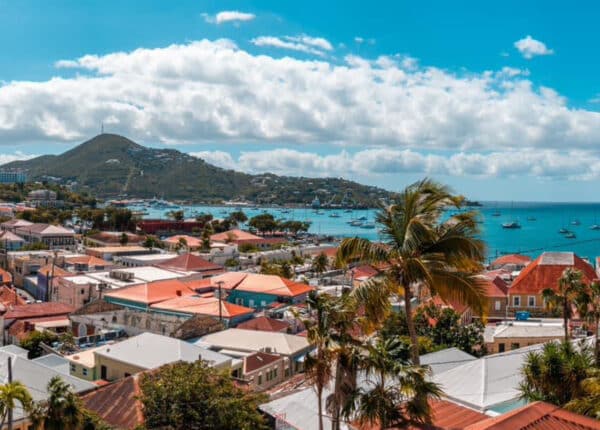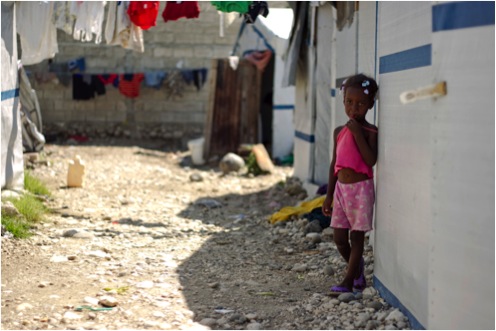Above: a girl stands in front of her home for persons displaced by the earthquake in Port-au-Prince. (UN Photo: Logan Abassi)
By Irwin Stotzky
Op-Ed Contributor
The news from Haiti is grim. Nineteen months after the devastating earthquake, the future remains frightening and uncertain for the vast majority of Haitians. The Haitian people have been completely excluded from the recovery decision-making process and remain vulnerable to the whims of the economic elite and the international community.
Reconstruction efforts are at a standstill. Indeed, Haiti has made almost no progress in rebuilding since the earthquake. Millions are displaced from their homes and rubble and collapsed buildings dominate the landscape. More than 600,000 people, displaced from their homes by the earthquake, remain in tent and tarp camps in and around Port-au- Prince. The other approximately one million people who were in these camps have been forced out. But their destinations remain shrouded in mystery, as does their welfare. Vast fields of rubble remain to be cleared. Beyond a planned, but not yet built, industrial park a bit east of Cap Haitien, there are no signs of reconstruction. Of the $5.6 billion pledged by international donors for the original eighteen month recovery period following the earthquake, less than 40 percent has been distributed, and hardly any of it has actually found its way to projects meant to help the Haitian people.
The political system is a disaster. Five months after Haiti’s two round presidential election, and three months after his inauguration, the presidency of Michel Martelly is close to running aground. The legislature has rejected both of his nominees for prime minister. Moreover, the election in which he gained power was illegitimate. There were many barriers to voter participation, such as inadequate and fraudulent voter registration, a paucity of voting stations, and the barring of Haiti’s largest political party—Fanmi Lavalas– as well as some smaller parties. Less than 25 percent of the eligible electorate actually participated. Without a fully functioning government, international aid and investment are almost nonexistent.
The suffering of the Haitian people continues unabated. The number of cholera fatalities has reached almost 6,000, with ten more people dying from cholera every day. More than 420,000 people have been infected since the outbreak started in October, and another 600 cases are registered daily. Even more frightening, Haiti is one step away from extreme famine as a result of the drought and subsequent rains. And, of course, these problems are exacerbated by the lack of a functioning government.
Haiti is not only one of the poorest nations in the world, it is also one of the most polarized and unequal in wealth and access to education, healthcare, and political power. The power elite— families that have controlled the nation since its independence from France—continues to dominate the country and its economy while more than half of the population survives on a household income of about 44 cents per day. And the classic divide between the economic elite and everyone else continues to grow. As ordinary Haitians suffer, the elite continue to live in luxury, in elegant homes situated above Port-au-Prince. As they have historically, they are profiting from the country’s latest tragedy. Haiti’s elite control access to rental cars, trucks, housing, offices, warehouses, and the local supplies, and the aid agencies must purchase those supplies from them. The elite also have a huge stake in how the reconstruction takes place. International efforts to help the poorest Haitians also make the rich even richer and increase the already harrowing gap between the economic elite and everyone else.
The Haitian “problem” is not merely political. It resides in the rigid class structure, in the military organization of a nation that seems to be at war with itself, in an economic system that discourages production and investment, and in socio-cultural elitism.
What’s to be done to move the Haitian people “from misery to poverty with dignity”? Under the best of circumstances, Haiti cannot be changed structurally without some yielding of power by the economic elite. The international community must create incentives for the elite which will push them towards reform. Several areas of concern are evident in the social, political and economic spheres. The first involves money. Macroeconomic instability is a major force in the ability of people to save and invest for the long term view. One way of alleviating this problem is through a dramatic rise in and focusing of the tax rate which would impose upon the privileged classes the costs of public investment in people and in infrastructure. There must be a universal, direct consumption tax—taxing in a steeply progressive way, the difference between income and savings. This would help finance the state while promoting capital formation and productive investment.
Second, there must be a push to train the poor majority in a variety of skills needed in the global economy. The state must attack and overcome the internal division of Haiti into two (or more) economies that are only tentatively and hierarchically connected. What is needed is the consolidation and development of a technologically skilled group of people in both the private and public sectors and the use of this group to lift up and transform the immense, backward second economy.
Third, if the breakdown of corporative control of the economy is to succeed, the strict requirements of capitalism must be imposed on the so-called free market capitalists through the privatization of the market. The government must control monopoly, encourage business formation, and even compete to counteract the power of the dominant big-business actors.
Fourth, there must be a massive investment in people and infrastructure, financed by taxes on the economic elite. There must be a priority of such claims on the budget. Preventative public health, sanitation, and food supplementation must be given preference over therapeutic health. Even more important, is the fact that the people must be educated. Free public schools must be open to everyone, and literacy programs created and developed. Education should focus on the mastery of generic practical and conceptual capabilities.
Finally, in the organization of government, politics and civil society, a new public law counterpart to the political economy I have just outlined must be created. A merger of the electoral characteristics of presidential regimes is needed. There must be a facility for rapid resolution of impasse through priority given to programmatic legislation, and liberal resort to plebiscites and referenda, Measures must also be taken to heighten the level and to broaden the scope of political mobilization in society, especially through the strengthening of political parties, public financing of campaigns, free access to the media, and the breakup of any broadcasting cartel. Direct democracy must be encouraged at all levels of society.
Are these changes possible in Haiti? The answer is yes, but only if the international community employs the correct incentives to pressure the economic elite to give up some of its power. If this takes place, and the vast majority of Haitians are allowed to determine their own fate by becoming the decision makers, real democratic change is possible.
Irwin Stotzky, a professor at the University of Miami School of Law, has served as the attorney and advisor to former Haitian President Jean-Bertrand Aristide, and as an advisor to the administration of Haiti’s most recent president Rene Preval. Stotzky organized and directed the investigations into the massive human rights violations committed in Haiti from 1991-1994, and has represented Haitian and other refugees on constitutional issues including in the United States Supreme Court.
Note: the opinions expressed in Caribbean Journal op-eds are those of the author and do not necessarily reflect the views of the Caribbean Journal.







